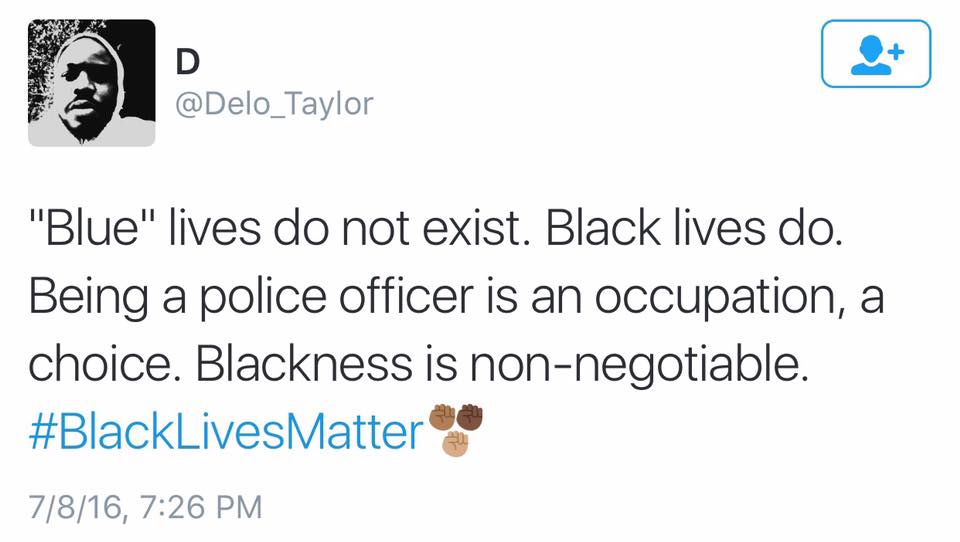I wrote this post the day this hashtag surfaced a few days ago and have been slow to edit it. So here it is, better late than blablabla.
—–
“Blue Lives Matter” is a phrase. Black Lives Matter is a movement.
“Blue Lives Matter” is a response to the BLM movement resulting from anger and fear on behalf of police officers and those who support them. I interpret the message behind this phrase as, “People are not valuing the lives of officers like they should.”
There’s something immediately off-putting about the phrase “Blue Lives Matter.” No one needs to be told that it’s an obvious rip off of BLM, and that struck me as ignorant and distasteful. Last night, a former classmate of mine shared something insightful on Facebook that helped me articulate why:

Working as a police officer is a choice, and an officer knowingly assumes risks by choosing that career. Yet every black person in the U.S. is in more danger than a given white person simply for having been born black. You see how the element of choice is lost here?
I don’t want to rip on police officers– not here, not now. They do good. Not always, but at least sometimes. In my pessimistic worldview, they’re only about as flawed as the rest of the human race: Some of them are good people, some of them are bad, and I’d assume most of them are somewhere in between. Don’t get hung up on the question of whether or not they’re “good,” whatever that means to you — that’s not the point here.
So what is my point?
I think “Blue Lives Matter” presents a tremendous learning opportunity for white people. Think of a police officer in your life that you care about, if you know one. Imagine this man or woman has a family that now, especially after the police murders in Dallas, hugs them extra long and tight, worries about them a lot more, and feels helpless to protect them from a world that wants to hurt them. They worry that their lives are in danger because of the uniform that they wear, presumably with the honorable purpose to protect people.
That’s incredibly sad, and of course everyone should feel empathy for these people and their families. After all, everyone wants to honor and protect the ones they love.
But the reality is that theirs is a similar fear that so many black families have to deal with, simply because this country has demonstrated to them over and over, day after day, that they are in danger because of the color of their skin. That black lives are less valued by our media and our justice system.
I’m white; I don’t personally know this about black families. It’s not a part of my experience. I also don’t personally know any police officers. But I’m reflecting on what I’ve heard and read from a variety of sources and all sorts of people, both from testimonies and actual statistics. And I have to say, the anger and fear that this “Blue Lives Matter” hashtag seems to express bears similarities to that which can be found burning hotly in the BLM movement.
There are stark differences between blue and black. But I think these feelings present a very important opportunity for empathy on both sides. And it’s worth noting that for the white police officers who are statistically proven to be more likely to use excessive force on black people, resulting in their deaths, these officers have more power in society and therefore bear more responsibility to explore that empathy, to understand the people they are trying to crush (whether they mean to do it or not), and to learn how to better the situation.
That’s the lesson I see in “Blue Lives Matter.”
Love,
capricecake